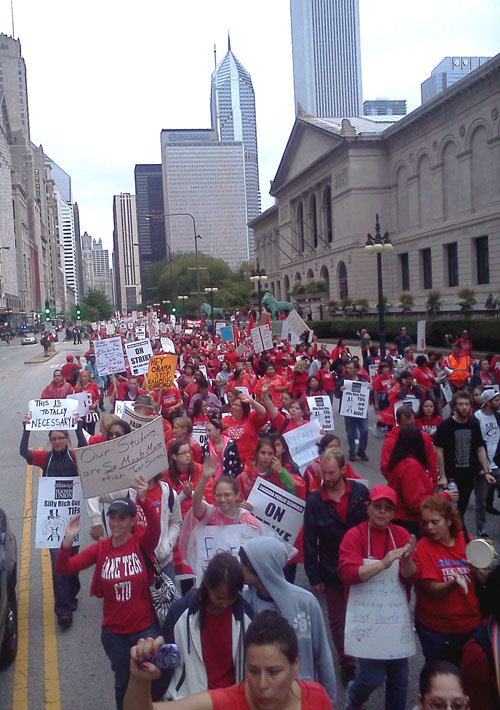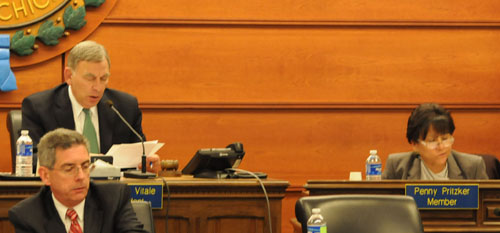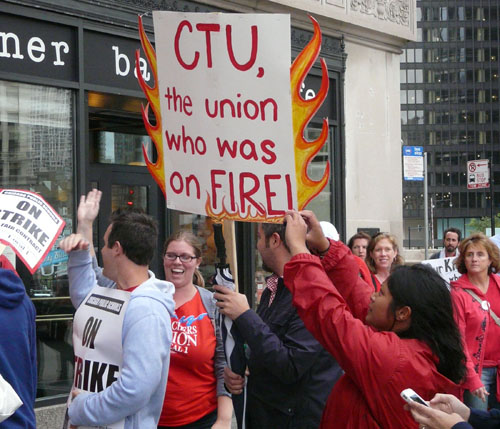Chicago Teachers Strike of 2012 continues as CTU delegates vote to return to the picket lines while members and delegates study the contract provisions
After a lengthy report from all four of the union officers who had been in negotiations with the Board, numerous questions, and some confused but finally clear debate, the members of the Chicago Teachers Union House of Delegates voted on September 16, 2012 to continue the Chicago Teachers Strike of 2012.
 Chicago Teachers Union members and supporters filled Michigan Ave. from the Chicago River south to Grant Park during their protest against the obscene TIF dollars poured into Penny Pritzker's Hyatt Hotels during the first week of the strike (above). Substance photo by David R. Stone. By a vote of 350 (yes) to 220 (no), the delegates voted to reconvene on Tuesday, September 18. Until then, the strike continues. The debate over the continuation of the strike was not over whether to continue it (the overwhelming majority of the delegates wanted that), but over whether the continuation would be for one day or two days. The final decision was that it would take two days for all of the delegates to be able to review the available details of the proposed agreement with their members.
Chicago Teachers Union members and supporters filled Michigan Ave. from the Chicago River south to Grant Park during their protest against the obscene TIF dollars poured into Penny Pritzker's Hyatt Hotels during the first week of the strike (above). Substance photo by David R. Stone. By a vote of 350 (yes) to 220 (no), the delegates voted to reconvene on Tuesday, September 18. Until then, the strike continues. The debate over the continuation of the strike was not over whether to continue it (the overwhelming majority of the delegates wanted that), but over whether the continuation would be for one day or two days. The final decision was that it would take two days for all of the delegates to be able to review the available details of the proposed agreement with their members.
Under the rules of the Chicago Teachers Union, the House of Delegates sets a strike date and can suspend a strike, pending a vote of the union's full membership on the contract itself. The contract is not ratified until the members have voted by majority to approve it. If the House votes to suspend the strike at its Tuesday, September 18, meeting, the strike would end and the members would be provided with the complete information about the proposed contract prior to voting in all the schools on the deal. In the past, the time between the ending of a strike and the vote on the proposed contract by referendum has been as long as two weeks. The reason is that CTU members have traditionally demanded not only the complete details of the proposed contract, but the time to study them prior to voting.
If the proposed contract is approved by a majority vote of the members in referendum, the union signs the contract with the Board and all provisions of the contract are in place for the duration.
One of the important facts about the present situation was repeated over and over not only by the union's leadership, but by many delegates. The union began negotiating with the Board of Education in November 2011, and had held more than 60 negotiating sessions with CPS representatives by late August 2012, when the union began setting the time lines for the strike. During that time, almost all of those sitting on the Board's side of the table changed. The only constant person for CPS was their "million dollar man," outside attorney James Franczek.
During the first six months of the negotiations, CPS was represented by Rachel Resnick, a former teacher and principal who had risen to the rank of Chief of Labor Relations at CPS. Resnick retired in June 2012, and in an unusual move CPS did not retain her as a consultant for the duration of the bargaining. Instead, she was replaced at the table by attorney Joe Moriarity, one of more than 40 lawyers in the CPS Law Department. By the time a strike threat was becoming a reality in September 2012, Moriarity and Franczek were joined by three newcomers: Board President David Vitale; Board 'Chief Education Officer' Barbara Byrd Bennett, and mayoral aide Beth Swanson. The "Chief Executive Officer" Jean-Claude Brizard was never part of the negotiations despite the fact that CPS is paying him the highest annual salary in the history of the school system — $250,000 per year, plus various "performance" bonuses.
 Chicago Board of Education members David Vitale (left rear) and Penny Pritzker (right) were put into power by Mayor Rahm Emanuel under the powers granted to Chicago's mayor by the "Amendatory Act of 1995." Despite 17 years of mayoral control, Vitale, Pritzker, and their fellow Board members continued to claim that "reform" had to be done to Chicago's teachers, instead of admitting that the 17 year experiment was a failure in Chicago, where many of the corporate reforms began. Above, Pritzker and Vitale are seen during the April 25, 2012 meeting of the Board. Substance photo by George N. Schmidt.While the CPS side of the table was playing musical chairs, the CTU negotiating team remained constant. The union's four officers took part in virtually all the sessions, along with attorney Robert Bloch. Also part of the CTU negotiating team was the "big team" consisting of 40 rank and file teachers and other union members from the schools and across the city. By the time the strike began, any rank-and-file member of the "big" team knew more about the negotiations and the contract fight than half the members of the Board's side. But the narrative in the corporate media of Chicago always acted as if these factors didn't matter.
Chicago Board of Education members David Vitale (left rear) and Penny Pritzker (right) were put into power by Mayor Rahm Emanuel under the powers granted to Chicago's mayor by the "Amendatory Act of 1995." Despite 17 years of mayoral control, Vitale, Pritzker, and their fellow Board members continued to claim that "reform" had to be done to Chicago's teachers, instead of admitting that the 17 year experiment was a failure in Chicago, where many of the corporate reforms began. Above, Pritzker and Vitale are seen during the April 25, 2012 meeting of the Board. Substance photo by George N. Schmidt.While the CPS side of the table was playing musical chairs, the CTU negotiating team remained constant. The union's four officers took part in virtually all the sessions, along with attorney Robert Bloch. Also part of the CTU negotiating team was the "big team" consisting of 40 rank and file teachers and other union members from the schools and across the city. By the time the strike began, any rank-and-file member of the "big" team knew more about the negotiations and the contract fight than half the members of the Board's side. But the narrative in the corporate media of Chicago always acted as if these factors didn't matter.
On the evening of September 16, 2012, the CTU website posted the following:
The House Has Spoken!
In a spirited debate, the House of Delegates voted Sunday to extend our strike through Tuesday. The vast majority voted to continue the strike, both to bring information about the tentative agreement to members and give the bargaining team time to get the Board’s commitments in writing. The delegates will meet Tuesday night, after discussions with members, to decide whether or not to call off the strike. After the agreement is completely drafted, members will have the opportunity, at a date to be determined later, to read it and vote on whether or not to ratify it.
 By the end of the first week of the strike, more than 25,000 teachers and school workers had been on the picket lines, and the creativity in "signage" was increasing. Substance photo by Kati Gilson.The agreement contains many victories, including extra art, music, and P.E. positions, increased positions for clinicians, class size enforcement for special education and ELL, No Merit Pay, salary gains, and no increased health care costs. Full details of what we won and what we wanted to win but didn't, are in this separate document.
By the end of the first week of the strike, more than 25,000 teachers and school workers had been on the picket lines, and the creativity in "signage" was increasing. Substance photo by Kati Gilson.The agreement contains many victories, including extra art, music, and P.E. positions, increased positions for clinicians, class size enforcement for special education and ELL, No Merit Pay, salary gains, and no increased health care costs. Full details of what we won and what we wanted to win but didn't, are in this separate document.
If we end the strike on Tuesday it does not end the fight! We know that the board is planning massive school closings, they are increasing the standardized tests our students must take, the infamous section 4.5 of the Illinois Educational Labor Relations Act still exists (which limits our ability to bargain for smaller classes and other important issues), and we will have to fight for the enforcement of our contract.
The strike and all the actions building up to it have strengthened us in ways we did not imagine possible just a short time earlier. We are stronger, more united, and we have built our power. The fight goes on and we are ready for it!
Rahm threatens restraining order
Mayor Emanuel's lawyers are working overtime to prepare charges claiming that the CTU strike is illegal. They have accused us of striking over issues that are not “mandatory bargaining subjects.” The Mayor is asking for a court order to force us back to work prior to members making that decision for themselves. Our strike IS legal, but the Mayor will attempt to use the courts as a PR stunt and tool against our fight for the future of our public schools.
The Mayor’s lawyers will say that our strike is illegal because we care too much about smaller class sizes; offering arts and PE to all students; the mayor’s planned closing of 80 to 100 schools; and more.
We have been clear from the start that we are striking for fair pay, working conditions and benefits that are protected under the law as well as to protest the Board’s illegal Unfair Labor Practices. The Mayor cannot silence the voices of CTU members. Whether our Delegates end the strike or not, the Mayor’s legal threats will not end CTU members fight for Education Justice.

